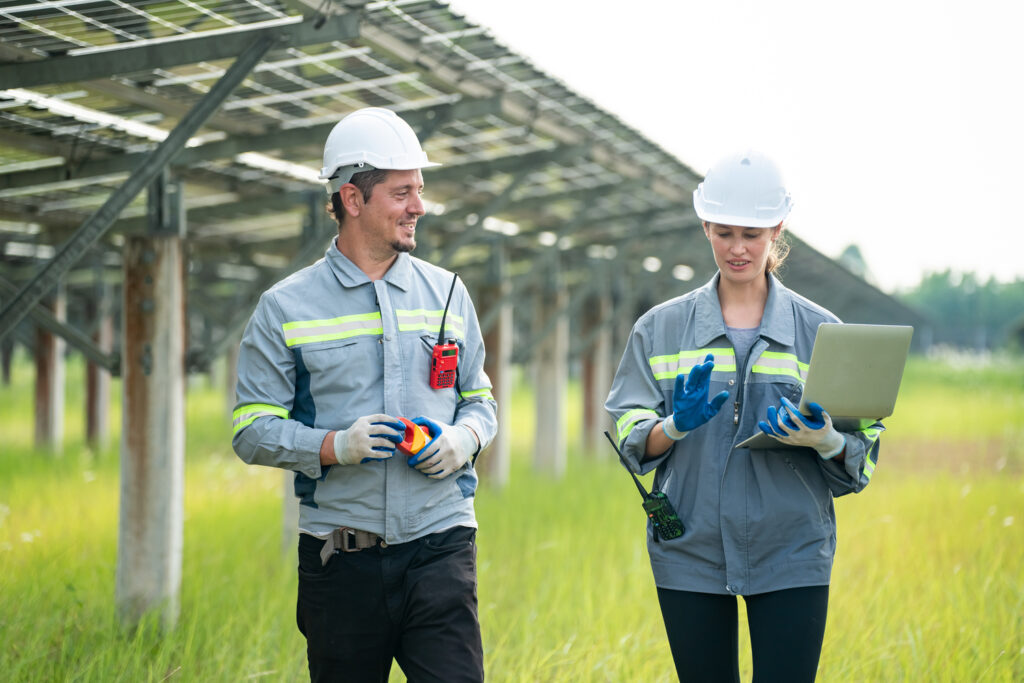Engineering Companies: Innovation and Sustainability
Engineering companies play a fundamental role in the development of infrastructure, technologies, and innovative solutions that drive economic growth and global sustainability. From the construction of major civil works to the design of complex energy generation systems, these companies are key to addressing society’s current and future challenges.
In a world moving towards a greener and more digital economy, engineering firms combine technical expertise, creativity, and strategic vision to deliver efficient and sustainable solutions.
What is an Engineering Company?
Engineering companies are organizations specialized in applying scientific, mathematical, and technological principles to design, plan, develop, and manage projects across various sectors. These companies tackle complex technical challenges, providing effective solutions tailored to the specific needs of each client and project.

– Definition and Role of Engineering Companies in Today’s Society
The role of engineering companies extends beyond mere construction or technical design. These organizations act as agents of change, promoting sustainability, optimizing resources, and leading the implementation of new technologies in key sectors such as renewable energy, transportation, industry, and environmental protection.
– Main Sectors in Which Engineering Companies Operate
Engineering companies play a crucial role in developing innovative and sustainable solutions across various strategic sectors. Below are the main areas in which they operate:
Energy and Natural Resources: Projects related to renewable energy generation, transportation, and storage, electrical grids, and green hydrogen production.
Infrastructure and Construction: Design and development of roads, bridges, airports, industrial and urban buildings.
Industry and Manufacturing Processes: Optimization and automation of production plants and industrial processes to enhance efficiency and sustainability.
Environment and Sustainability: Projects focused on reducing carbon footprints, waste management, water treatment, and environmental conservation.
Transportation and Mobility: Solutions for improving logistics, sustainable urban transport systems, and mobility network optimization.
Water and Sanitation: Development of systems for water supply, purification, and wastewater treatment.
Technology and Digitalization: Implementation of smart systems, industrial automation, and digital transformation to optimize processes and resources.
These sectors represent key areas where engineering companies apply their expertise to drive innovation, operational efficiency, and sustainable development.
Types of Engineering Companies
Engineering companies are classified into different types based on their focus, specialization, and scope of services. Each type addresses specific challenges and provides solutions tailored to clients’ needs. Below are the main types of engineering companies, along with representative examples.

– Engineering Consulting Companies
These companies provide technical and strategic advisory services for engineering projects. They conduct feasibility studies, risk analysis, conceptual design, and detailed planning to ensure project success.
Example: RPow offers specialized consulting in thermal energy storage solutions, industrial decarbonization, and green hydrogen projects to support the energy transition.
– Engineering Design and Project Companies
These companies focus on developing blueprints and technical specifications necessary for project execution. They transform ideas and concepts into detailed and functional designs.
Example: Foster Wheeler, which provides design and engineering solutions for industrial plants, refineries, and power generation systems.
– Engineering, Construction, and Assembly Firms
These companies specialize in the physical execution of projects, overseeing and managing construction, equipment installation, and technology implementation.
Example: ACS Group, a global leader in the construction of large infrastructure and industrial projects.
– Specialized Engineering Companies
They offer highly specialized services in specific sectors such as renewable energy, aerospace engineering, materials science, or industrial automation.
Example: Siemens Energy, focused on advanced solutions for power generation and transmission.
– EPC (Engineering, Procurement, and Construction) Companies
These companies handle all project phases, including engineering, material and equipment procurement, and construction. They deliver turnkey solutions, providing fully operational projects.
Example: Technip Energies, specializing in turnkey projects in the energy and chemical sectors.
– Engineering Maintenance and Operations Firms
They ensure the proper functioning and maintenance of industrial plants, energy systems, and key infrastructure.
Example: Veolia, dedicated to the operation and maintenance of water treatment and energy facilities.
Each type firm plays a vital role in the engineering project lifecycle, from initial consulting to construction, operation, and maintenance. These organizations work in synergy to deliver effective, innovative, and sustainable solutions.
The Role of Engineering Companies in the Energy Transition
Engineering companies play a fundamental role in the energy transition, being responsible for the development, implementation, and optimization of innovative technological solutions that help reduce carbon emissions, increase energy efficiency, and maximize the use of available renewable resources. Their technical expertise and ability to adapt to global challenges make them key players in the path toward a more sustainable future.

– Contribution to Industrial Decarbonization
Industrial decarbonization is a priority objective for reducing global greenhouse gas emissions. Engineering companies contribute through:
Development of Clean Technologies: Implementation of energy storage systems and renewable energy solutions to replace fossil fuels.
Optimization of Industrial Processes: Use of advanced analysis and simulation techniques to minimize energy consumption in sectors such as the chemical, metallurgical, and cement industries.
Green Hydrogen Projects: Design and construction of plants for the production and storage of renewable hydrogen, crucial for replacing polluting energy sources in industrial processes and the transport sector.
– Innovation in Energy Storage
Energy storage is essential to ensure the stability and flexibility of the electrical grid, especially when production depends on intermittent sources like solar or wind energy. Engineering companies are driving innovation in this area through:
Hybrid Storage Systems: Combination of thermal energy storage and lithium batteries to maximize efficiency and storage capacity..
Development of Advanced Materials: For example, using phase change materials to optimize heat retention and release.
Large-Scale Projects: Design and implementation of large-scale energy storage systems tailored to the needs of electrical grids and industrial plants.
– Implementation of Renewable Energy Solutions
Engineering companies are responsible for integrating and optimizing systems based on renewable energy, ensuring their technical and economic viability. Among their main contributions are:
Design and Installation of Renewable Plants: Development of solar, wind, hydro, and hybrid plants, among others, to maximize the use of clean energy.
Optimization of Existing Infrastructure: Adapting traditional plants and industries to incorporate green energy sources.
Energy Flexibility: Implementation of energy storage systems and other solutions to balance supply and demand, enabling better integration of renewable energy into the electrical system.
Current Challenges for Engineering Companies
Despite their crucial role in the energy transition and industrial development, engineering companies face significant challenges that test their ability to adapt, innovate, and demonstrate resilience. These challenges range from digital transformation to the lack of specialized talent and increasingly stringent environmental regulations.

– Digitalization and Process Automation
Digitalization has become an essential tool for optimizing engineering processes, but it also presents a significant challenge:
Implementation of Digital Technologies: Integration of advanced simulation systems, artificial intelligence, and big data to improve efficiency at all stages of a project.
Process Automation: Use of digital tools to automate repetitive tasks and reduce human errors.
Cybersecurity: Protecting critical infrastructure from cyberattacks and failures in automated systems.
– Shortage of Resources and Specialized Talent
The growing demand for innovative technological solutions has created a gap in the availability of specialized talent:
Lack of Qualified Professionals: Shortage of engineers with experience in key areas such as energy storage and renewable energy.
Talent Retention: Companies must offer competitive conditions and professional development opportunities to attract and retain top talent.
Continuous Training: The need for training programs to stay up-to-date with the latest technologies and regulations.
– Adapting to Global Environmental Regulations
Engineering companies must continuously adapt to new environmental regulations to meet global sustainability goals:
Compliance with International Regulations: Aligning with standards set by agreements such as the Paris Agreement.
Emission Reduction: Developing projects aligned with reducing the carbon footprint.
Environmental Certifications: Obtaining ISO and other certifications to ensure sustainable practices.
Future Trends in the Engineering Sector
The engineering sector is undergoing a profound transformation driven by technological innovation, sustainability, and globalization. These trends are redefining the processes, tools, and strategic objectives of companies in the sector, making them key players in addressing global challenges such as climate change, the energy transition, and industrial digitalization.

– Sustainability and Green Engineering
Sustainability has become a fundamental pillar for engineering companies, leading to green engineering, which aims to minimize environmental impact throughout all phases of a project:
Eco-design: Implementation of sustainable practices and materials in the design of infrastructures and energy systems.
Energy Efficiency: Development of projects that optimize resource use and reduce energy consumption.
Carbon Footprint Reduction: Design of solutions based on renewable energy and hybrid energy storage systems.
Example: Designing an industrial plant with integrated thermal energy storage systems to ensure sustainable operations.
– Artificial Intelligence and Big Data in Engineering
The adoption of Artificial Intelligence (AI) and Big Data is revolutionizing the way engineering companies approach the design, construction, and maintenance of infrastructures:
Process Optimization: Use of predictive algorithms to identify failures and optimize the performance of industrial and energy systems.
Big Data Analysis: Making informed decisions based on real-time data analysis from sensors and connected systems.
Digital Twins: Creating virtual replicas of plants and systems to simulate their behavior before actual implementation.
Example: Developing a digital twin for a solar thermal plant with latent heat storage systems, enabling precise adjustments before physical construction.
– Collaborative International Projects
Globalization has promoted greater collaboration between engineering companies from different regions, allowing the execution of more ambitious and technologically advanced projects:
Strategic Alliances: Cooperation between companies to share knowledge and innovative technologies.
Multinational Projects: Development of large-scale energy infrastructures across multiple countries.
International Standards: Adaptation to global regulations to ensure interoperability and efficiency of projects.
Example: Participation in an international project for the implementation of large-scale renewable energy storage systems in regions with high solar production.
The Most Well-Known Engineering Companies Worldwide
The large engineering companies worldwide are leaders in innovation, technology, and the execution of large-scale projects. These companies lead key sectors such as infrastructure, energy, transportation, industrial construction, and sustainability, setting global standards for efficiency, quality, and environmental responsibility.
Some of the most prominent engineering companies include:
Siemens Energy: Specializes in sustainable energy solutions, including generation, distribution, and energy storage.
ABB: A leader in industrial automation, robotics, and energy-efficient systems.
AECOM: Known for its expertise in large-scale infrastructure projects and sustainable urban development.
Schneider Electric: Focused on efficient energy management and industrial automation.
Arup: Renowned for civil engineering and sustainable architecture.
Each of these companies represents a model of technological innovation and operational excellence.

RPow: A Consultancy and Engineering Firm Specialized in Sustainable Energy
RPow has established itself as a leading consultancy and engineering firm specialized in sustainable energy, standing out for its commitment to innovation, technical expertise, and personalized approach to each project. Its market presence and tailored solutions to meet the needs of each client make it a key strategic partner in the field of energy transition.
Commitment to Sustainability and Innovation
At RPow, sustainability and innovation are core values that guide each of its initiatives:
Sustainable Energy Solutions: Projects designed to minimize the carbon footprint and maximize efficiency.
Research and Development (R&D): Continuous investment in new energy storage technologies and clean energy systems.
Long-Term Approach: Development of sustainable strategies to ensure the viability and positive impact of each project.
RPow’s Focus on Energy Storage and Sustainability
RPow focuses its activities on offering energy storage solutions tailored to the needs of each client. Its services include:
Thermal Energy Storage Systems: Optimizing industrial processes through innovative solutions.
Applications in Industry and Energy Generation: Adapting thermal energy storage systems to various industrial and energy applications.
Green Hydrogen Projects: Developing infrastructure for renewable hydrogen production and storage.
Specialized Technical Consultancy: Comprehensive advice to maximize energy efficiency and reduce the carbon footprint, specializing in solar energy.
Customized Solutions for Each Project
One of RPow’s main differentiating values is its ability to provide solutions tailored to the specific needs of each client:
Analysis of Specific Requirements: Detailed study of each project to understand its particularities and challenges.
Customized Designs: Creation of tailored solutions that maximize operational efficiency.
Comprehensive Support: From the conceptual design phase to the implementation and operation of energy systems.
Process Engineering at RPow
Process engineering is crucial in the design, optimization, and operation of complex energy systems, essential in energy generation and storage projects. This discipline ensures that each stage of the energy process, from generation to storage and distribution, is efficient, safe, and sustainable.
At RPow, process engineering plays a central role in the development of innovative solutions tailored to the current challenges of the energy transition. The company applies advanced engineering knowledge to design optimized thermal storage systems, implement processes for renewable hydrogen production, and develop energy plants integrated with hybrid technologies.
Thanks to its experience in process engineering, RPow ensures projects that meet the highest standards of energy efficiency, environmental sustainability, and economic competitiveness, actively contributing to a cleaner and decarbonized future.
Featured News about RPow Engineering Company
This section will include links to the most relevant news about the Seville-based engineering company RPow, highlighting its achievements, innovative projects, and strategic collaborations in the field of sustainable energy engineering. These news articles reflect RPow’s positive impact on the sector and its contribution to the global energy transition.
RPow develops a pilot plant for hybrid thermal energy storage technologies
RPow collaborates with Polish group ASE to drive green hydrogen projects from Seville
RPow’s energy storage solutions and growth highlighted in Seville
Renewable
Power Onwards
Engineers with more than 20 years of experience
